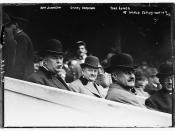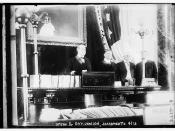In the fall of 1982, McNeil Consumer Products, a subsidiary of Johnson and Johnson, confronted with a crisis when seven people on Chicago's West Side died mysteriously. Authorities determined that each of the people that died had ingested an Extra-Strength Tylenol capsule laced with cyanide. The news of this incident traveled quickly and was the cause of a massive, nationwide panic. These poisoning made it necessary for Johnson and Johnson to launch a public relations program immediately, in order to save the integrity of both their product and their corporation as a whole.
Officials at McNeil Consumer Products made it clear that the tampering had not taken place at either of its plant, even though cyanide was available on the premises. A spokesman for Johnson and Johnson told the media of the company's strict quality control and said that the poisoning could not have been performed in the plants.
Because the cyanide laced Tylenol had been discovered in shipments from both of the company's plant and had only been found in the Chicago area ((Beck, 33).
The first thing that Johnson and Johnson did was to pull over $100 million worth of products from the shelves. This was the largest recall of its kind. Naturally, the repossession of 31 million units of distributed products was not an easy task, but the crisis was far from over. Not only did the firm have to protect the public's safety through this recall, but they also had to protect their image and financial stability. In insisting on a complete recall, Johnson and Johnson were already effectively communicating to the public, investors, and to the corporate world that the public's safety came before profits. They simultaneously alerted customers throughout the nation not to consume any Tylenol product. They carried this message out through...


